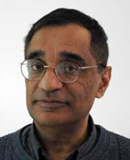Herbert C. Kelman Seminar on International Conflict Analysis and Resolution featuring speakers:
- Ali S. Asani, Professor of Indo-Muslim and Islamic Religion and Cultures and Director of Prince Alwaleed bin Talal Program in Islamic Studies at Harvard
- Jeff Seul, Lecturer on the Practice of Peace at Harvard Divinity School and Chairman of the Peace Appeal Foundation
This series is sponsored by the Weatherhead Center for International Affairs; the Nieman Foundation for Journalism; Program on Negotiation at Harvard Law School; and Shorenstein Center on Media, Politics and Public Policy.
The theme of the 2015–2016 Herbert C. Kelman Seminar on International Conflict Analysis and Resolution is negotiation, conflict, and the news media. It explores the relationship between the news media and conflict-resolution efforts worldwide and examines how the framing and reporting of conflict influences the public understanding of events. The seminar considers ways to strengthen the capacity to prevent, resolve, and transform ethno-national conflicts. The topics this year include the rise of political Islam, domestic conflicts related to race, the impact of reporting techniques on conflict, the neuroscience of conflict, new threats to national security, and more. Speakers include experts from academia and the media, as well as political actors from conflict regions. For more information, contact Donna Hicks at [email protected].
About the speakers:
Ali S. Asani is Professor of Indo-Muslim and Islamic Religion and Cultures at Harvard and Director of the University’s Prince Alwaleed bin Talal Program in Islamic Studies. He attended Harvard College, with a concentration in the Comparative Study of Religion and continued his doctoral studies in the Department of Near Eastern Languages and Civilizations. He teaches courses on various aspects of the Islamic tradition including two courses in the undergraduate general education curriculum. He is particularly interested in the interaction between religion, literature and the arts in Muslim Societies. Professor Asani’s use of the arts in pedagogy is part of his broader effort to eradicate what he calls “religious illiteracy.” For more than 30 years, he has dedicated himself to helping others better understand the rich subtext and diverse influences that make religion — in particular, Islam — a complex cultural touchstone. In 2002, he was awarded the Harvard Foundation medal for his outstanding contributions to improving intercultural and race relations by promoting a better understanding of Islam. More recently he received the Petra C. Shattuck Prize for distinguished teaching from Harvard’s Division of Continuing Education.
Jeff Seul, MTS ’97, LLM ’01, is Lecturer on the Practice of Peace at Harvard Divinity School. He also serves as chairman of the Peace Appeal Foundationand is a partner in the international law firm Holland & Knight. The Peace Appeal Foundation, which was founded with a mandate from five Nobel Peace Laureates, including Nelson Mandela, Desmond Tutu and FW de Klerk, is an international NGO that helps local stakeholders launch and sustain broad-scale peace and national dialogues processes to end or avoid war. Jeff earned an MTS at Harvard Divinity School and an LLM in international law at Harvard Law School. After graduating from HDS, Jeff taught negotiation and conflict resolution courses for several years at Harvard Law School, where he developed Harvard’s first course on complex, multiparty negotiations. He was also a senior associate of the Program on International Conflict Analysis and Resolution at the Weatherhead Center for International Affairs. Jeff’s scholarship at Harvard and since has focused on religion and peacebuilding, including the role of identity dynamics in violent conflict involving religious groups and approaches to transformation of conflicts with a religious dimension. He also writes about possibilities for consensual resolution of legal disputes involving deeply-held moral values. His 1999 article “’Ours is the Way of God’: Religion, Identity and Intergroup Conflict: in the Journal of Peace Research was among the first to combine work in the social sciences and religious studies to explain why religion and conflict sometimes become entangled. A forthcoming article, entitled “Trust the Stranger as Your Own: Tapping Religious Prosociality for Conflict Transformation,” draws upon recent social scientific work to suggest ways in which religion can contribute to peacebuilding.


